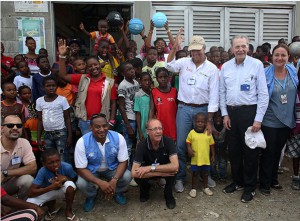TOLERANCE AND SOLIDARITY .
An article from The official website of the Olympic Movement
The IOC Honorary President and Special Envoy of UN Secretary-General Ban Ki-moon for Youth Refugees and Sport, Jacques Rogge, this week concluded a two-day humanitarian mission to Colombia, where he had the opportunity to get a first-hand look at the challenges faced by Internally Displaced People (IDPs) in the country.

Click on the photo to enlarge
caption: ©Coldeportes (5)
His visit was also an opportunity to announce a new sport-based project in the Quibdò and Buenaventura areas located in the Pacific region, highly affected by the issue. The project, jointly funded by the IOC and the United Nations High Commissioner for Refugees (UNHCR), aims at protecting young people and children from the risks of armed conflict and other forms of violence through sport.
Jacques Rogge was accompanied on his trip by Colombian Sports Minister and former IOC Member Andrés Botero Phillipsbourne, Colombian National Olympic Committee (NOC) President Baltazar Medina, Colombian wrestler and double Olympic medallist Jackeline Rentería Castillo and a UNHCR team led by Country Representative Stéphane Jaquemet.
The mission started with a visit to the UNHCR office in Bogotá to discuss the displacement of the local population, which has stemmed from 50 years of internal conflict, resulting in more than 6.9 million IDPs in the country, of which an estimated 38 per cent are children and adolescents. The UN Refugee Agency works on solutions to address the heavy consequences faced in particular by children and women in the area. The meeting was followed by a visit to the Ministry of Sports – Coldeportes – and the NOC to discuss possible synergies around the implementation of sports programmes for the IDPs.
Special Envoy Rogge also visited the UNHCR Office in Quibdó and the community of Villa España, which currently hosts a hundred IDP families. He had the opportunity in the field to speak with representatives from local youth association AJODENIU, who expressed their strong desire for sports infrastructure and programmes to be developed in light of the current lack of the most basic facilities.
The new project unveiled by the Special Envoy is called “The alternative of sport: protecting children and young people from the risks of armed conflict and other forms of violence”. Its precise goal is to address these needs while using sport to create a safe environment and a place of exchange, where young people can receive appropriate support and develop increased awareness of their rights and self-protection mechanisms. For young people who have experienced conflict, war and displacement, participation in sports and recreational activities can provide a constructive outlet and much-needed psychosocial support. Sport also provides a healthy alternative to potentially harmful or risky lifestyles and role models.
(Click here for the original French version.)
(article continued on the right side of the page)
What is happening in Colombia, Is peace possible?
(article continued from the left side of the page)
As mentioned by Ingrid Palacios, a young displaced representative of the youth association: “Displacement has not killed our dreams and I am sure in our community there are many potential Olympic medallists, we only need the opportunity to prove it. We know this dream can become a reality, because sports will motivate us to become better persons, provide us with a sense of teamwork and foster a culture of peace which we really need in our country.” Additionally, in the specific case of indigenous communities, support for the practice of traditional sports will contribute to the strengthening of community identity and social cohesion.
The joint IOC-UNHCR project, to which Coldeportes and the NOC have pledged their full support – starting with the provision of a multi-sport infrastructure provided by the Ministry – is expected to last three years. Its launch next year will coincide with the expected signature of a peace agreement in Colombia between the Government and the long-warring factions in March 2016.
Commenting on these historic developments, Special Envoy Rogge said: “It is our duty to help the youth and the local population, and to support the ongoing peace efforts. And what better way is there to do it than through sport, which is a recognised strong enabler of youth empowerment, health, education and social inclusion”
UNHCR Country Representative Jaquemet said: “Athletes are role models for the unprivileged and displaced youth, and we believe in the powerful role that sport can play, not only in their personal reconstruction, but also for the peace process at large.”
For the last 20 years, the IOC and UNHCR have been using sport to support healing and development among young refugees in many camps and settlements around the world. Following the approval of Olympic Agenda 2020, the IOC’s strategic roadmap for the future of the Olympic Movement, and in light of the current global refugee crisis, the IOC has created a special fund of USD 2 million to develop relief projects through sport in collaboration with NOCs around the world. Details of some of the projects already under way can be found here and here.
With the help of NOCs and the UNHCR, the IOC is also in the process of identifying a number of athletes living in forced displacement, and will help them through its Olympic Solidarity programmes to take part in the Olympic Games Rio de Janeiro 2016. The IOC is confident that this initiative will bring hope to the refugee athletes who wish to return to training and compete at the Games. It is also intended as a symbol of hope for all refugees around the world, which will help raise awareness of the magnitude of the crisis.